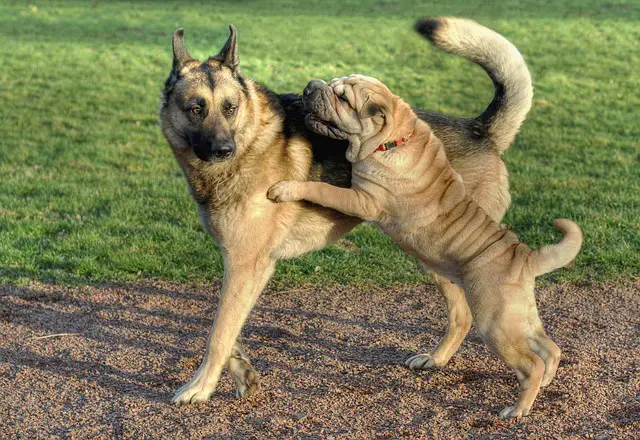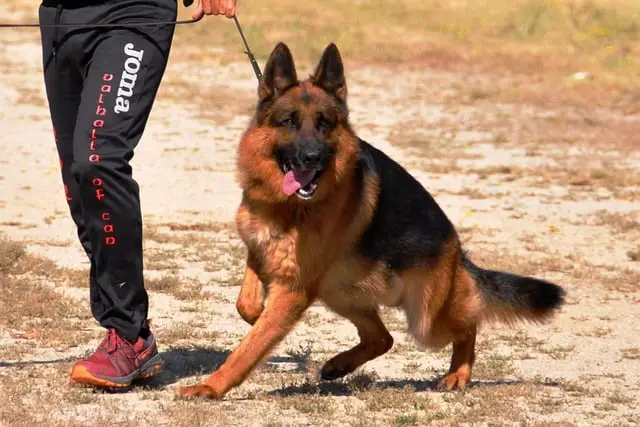The German shepherd is a breed known for its loyalty, protectiveness, and as a “police dog” as well as working with the military and herding sheep.
They are very multitalented! Unfortunately, this breed is severely misunderstood, having many people are terrified of them due to a bad reputation and a very loud bark, which is definitely “worse than their bite.
” Most often an out-of-control German shepherd is due to their owner and bad training. As the saying goes, “there are no bad dogs, just bad owners.”
The German shepherd is either loved or feared and two of the main reasons for the fear are improper breeding and improper training.
In this post, I will deal with German shepherd behavioral problems, what to do if your German shepherd is becoming aggressive, and German shepherd aggression training.

For your Puppy’s vitamin supplement, foods, toys, or other dogs product please visit the Sundays for dogs website.
German Shepherd Behavioral Problems
German shepherds have many of the same behavioral problems as other breeds and most are remedied with consistency, patience, and training.
The German shepherd is an extraordinarily intelligent breed and excels in training so any bad habits can either be avoided altogether or stopped in their tracks.
Listed below are some common German shepherd behavioral problems.
Jumping
You may think that it’s so cute and adorable when your German shepherd puppy jumps all over you and guests may feel the same way.
“What a delightful puppy,” everyone will exclaim, giving your puppy all of that “positive” praise. It is a different story when your “puppy” is a 65 or 75-pound adult and jumping on you, your family, and your guests. It will not be quite so cute then and may even be downright dangerous.
You have programmed your shepherd to think that jumping is fine by giving them positive reinforcement. Suddenly giving them negative attention when they are large will cause much confusion.
From day one your puppy should learn that jumping is unacceptable. Tell your pup “no” when they jump and correct them until they understand.
If that doesn’t work, ignore them and give them no attention. They will soon realize that jumping makes you go away.
If they are older and still jumping, putting your knee up every time may work, or dropping a metal pan or cookie sheet should deter them from the loud clatter.
Barking
Let’s face it, German shepherds are barkers and that is a given. Your shepherd may bark at the doorbell, strangers, someone on your property, other animals, noises they may hear but you don’t, and any number of things.
Barking may not be a bad thing if you live in an undesirable neighborhood. That loud boom will definitely deter any would-be intruder.
When barking becomes excessive, this is when problems arise and everyone’s nerves are frayed.
First, you must determine what your shepherd is barking about. If it’s almost everything then an obedience class, a bark collar, or some behavioral therapy may do the trick if reprimanding doesn’t work.
To check your shepherds’ health status or their DNA checks, please visit the Embark vet website for all the help you may need.
Rebelliousness and Disobedience
The German shepherd is a very confident and sometimes independent breed. They can become quite rebellious, disobedient, and stubborn if not trained properly.
You have to set the tone that every pack has a leader and you are it! They are a pack member, never a leader. Once they are a strong and muscular adult, it will be pretty hard to drive that point home if it isn’t established early on.
Chewing
Chewing usually begins as a consequence of teething pain in puppies. Chewing is actually a natural action for dogs and helps to alleviate
gum pain in teething.
It is when chewing spills over and includes your furniture, expensive or favorite shoes, and just about anything laying around, that this becomes a big problem and bad behavior.
When your German shepherd is a puppy don’t allow them to have the whole house to explore unsupervised. Remove anything valuable or sentimental until they are older and fully trained.
Give them plenty of their own toys to chew on that are acceptable. Reward their good behavior with plenty of praise.
Nipping and Biting
When playing with your puppy or any puppy, nipping and biting can become an issue, especially when roughhousing ensues.
This needs to be controlled and stopped because again when your German shepherd becomes full-grown, biting is definitely not acceptable behavior.
A German shepherd’s jaws are extremely strong and biting is never okay. When your pup becomes too rough, simply screech, “ouch!” It will startle them. Walk away and ignore your puppy even if they whimper and whine.
When they are calm and settled down, resume play. Every time they dabble in nipping and biting, repeat the same scenario. They will learn that you will not tolerate that behavior, which produces no attention or fun times.
Digging
Digging is never good or pleasing to the eye, especially if your lawn is golf course-worthy! If your pup continually digs in your yard, they may be bored.
Play with them or give them toys to play with outdoors to keep them busy.
If those ideas fail, you can always give them a dirt pile in a corner of your yard specifically for their digging pleasure!
Aggression In German Shepherds
German shepherds again get a bad reputation for being dangerous and aggressive. Aggression in these dogs is only acceptable if they are K9 police partners or military dogs.
These dogs go through extensive training and only show aggression for protection against criminals or the enemy. They are obedient and know their place with their partners and families.
This type of aggression has no place in your house as a family pet. A few reasons for aggression are listed below.
- pain – If your shepherd is in pain they may lash out at you or anyone else trying to help them.
- overprotective/territorial – Your pup may be too protective of you, your family, and also your property. Being territorial may spill over into showing aggression with their food and toys. This can become dangerous especially if small children are in your household.
- domination – Because German shepherds are pack animals, they want to be the alpha dog in charge of the pack. It is not acceptable for them to dominate and you must give them a clear message from the beginning that you are the pack alpha.
- unsocialized – If your shepherd did not receive any initial socialization at the breeders and if you do not acclimate them to as many different people, places and situations, this too can cause aggression as they age.
- fear – You wouldn’t think that German shepherds are ever fearful but sometimes they can be big babies and skittish about certain things they encounter. This may cause them to lash out in fear and that is why socialization is so important. The more things they are exposed to at a young age, the easier it will be for them to cope.
- genetics – If their parents or ancestors in their breeding line have suffered from behavioral issues, aggression can have a genetic basis.

German Shepherd Aggression Training and Solutions
To deal with German shepherd aggression, you must first identify the triggers that cause this behavior.
There may be one or more triggers. Listed below are some triggers as well as remedies and solutions for treating aggression.
Triggers
- Loud or strange noises
- Strangers, especially on your property
- Children, especially if they are unpredictable like toddlers
- Loud cars (when walking)
- Skateboards, bicycles, motorcycles, etc.
- Other dogs or animals
If you can identify the trigger, avoiding it, if possible, is the best way, although this may not be easy or wise.
Working with a behavior therapist, who can acclimate them to these triggers may be the only way, especially if they have many triggers.

Exercise and Stress
Make sure your pup gets plenty of exercise so they don’t become hyper and bored. Exercise releases good hormones in people and dogs for a calmer more relaxed individual, human or canine. Eliminate stress in your household if it’s too crazy or busy at times.
Obedience Training
Take your pup to stepped-up obedience training classes with a professional that deals with aggression in dogs such as the Brain Training For Dogs course.
Your shepherd may need extensive training if they have many triggers or it may be an easier fix than you think.
Your pup’s trainer will work up a program and exercises to work on at home including all the necessary do’s and don’ts.
Muzzle or Harness
Use a muzzle or harness or both if your shepherd is unpredictable in certain situations. Many mild-mannered dogs can lash out if they are fearful and need to be muzzled, most often at their veterinarian’s office. It is better to be safe than sorry.
Medication
Medication may be needed even for short-term use if your German shepherd is overly high-strung and aggressive to calm them down.
Seek help
Do not wait if your German shepherd shows any signs of aggression. It is imperative that aggression be dealt with and stopped before it escalates to the point of no return.
Many municipalities have strict laws regarding dog bites. This is a fact you don’t want to find out the hard way.
Prevention is the key to raising a German shepherd to be an excellent family pet. With time, patience, proper socialization, diligent training, plenty of exercises,s and you at the helm as pack leader, your German shepherd will grow into a well-mannered and obedient companion.
